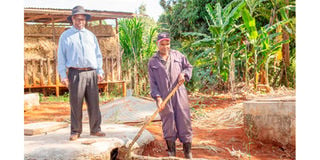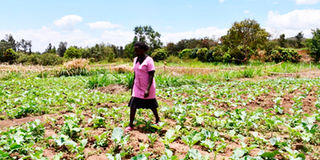The African Biodigester Component (ABC) supports the growth and sustainability of the commercial biogas sector in Sub-Saharan Africa. In particular, it covers Burkina Faso, Kenya, Mali, Niger and Uganda.
The five-year programme ends in December 2025. Its aim has been to create sustainable biodigester markets in the five countries of focus.
In Burkina Faso, Kenya and Uganda, the ABC has built on the results of the Africa Biogas Partnership Programme. This is expected to result in mature markets that will continue to scale and provide energy access without public support. In Mali and Niger, ABC has been helping to develop basic market foundations.
A biodigester is a facility used for converting organic waste, known as feedstock, into biogas and nutrient-rich fertilizer known as bioslurry, in the absence of oxygen.
Biodigesters play a pivotal role in sustainable waste management and renewable energy production, mitigating environmental degradation, promoting agricultural benefits, and fostering clean cooking and renewable energy, making them crucial components of a green and resilient future.
The importance of biodigesters lies in their multifaceted impact on environmental conservation, energy sustainability, and agricultural practices:
Renewable Energy Production: The biogas produced by biodigesters serves as a clean and renewable energy source, contributing to diversifying the energy mix and enhancing energy security.Agricultural Benefits: Biodigester by-products, such as nutrient-rich slurry, serve as potent organic fertilizer, enhancing soil fertility and promoting sustainable agricultural practices.Community Empowerment: Biodigesters offer a decentralised solution for waste management and energy production, empowering communities to implement and maintain biodigester systems locally.
In Kenya, the ABC, which is funded by the Dutch Ministry of Foreign Affairs (DGIS), the Danish International Development Agency (DANIDA), and the European Union (EU), is facilitating a shift of the biodigester market from its current pioneering to the expansion phase where 20,017 small and 250 medium-sized biodigesters will have been installed.
Biogas has a huge potential for development in Kenya, as the technology is already known especially among dairy and pig farmers. We can identify small-scale as (0 to 50 cubic-metre), medium-scale as (50 to 500 cubic-metre) and large-scale as (more than 500 cubic-metre) biodigesters.

Photo credit: GIZ
According to biodigester companies, potential clients for small-scale biodigesters can qualify if they have at least two cows, 15 pigs or 500 chicken. The potential for small-scale biodigester has been further divided between the dairy, the pig and the poultry sub-sectors, as these animals are generally kept in stables and generate enough manure to feed the biodigesters and produce biogas as well as bioslurry.
Farmers who own large herds of livestock in zero-grazing units or feedlots (20 cows), pig stables (100 pigs), and chicken pens (2,000 birds in cages), would need a biodigester to treat manure, produce biogas for their energy needs, and bioslurry for their crops. They are the potential clients of medium scale biodigesters.
Other clients include institutions producing wastewater (eg, sewage from schools, hospitals, slaughterhouses, industries, prisons, and municipalities), agro-processers (eg, fruit processing, coffee wet mills, flower, sisal), and food markets.
One of the key parameters that influence the volume of biogas production is the total feedstock volume. This is the average amount of bio-material added to the biodigester each day.
The feedstock for small-scale and medium-scale biodigesters is mostly agricultural solid wastes produced from farming activities. Every stage and phase of the agricultural-food chain can generate significant solid and liquid biowastes.
To determine the potential for biogas production, for a specific site, a production sector or a county, information is required on the type and quantity of feedstock available. A practical example of this can be seen in the heart of Murang’a county, where Peris Wanjiku’s quality of life and business have seen a major transformation since installing an eight cubic-metre biodigester fed from her three cows at her home in Kiang’atia village.
As a secretary of the Kiang’atia Dairy Farmers group, Peris previously faced tremendous challenges at home to meet her cooking and farming needs, while at the same time balancing this off with commitment to her chama.
Several times a week, she would need to brace herself for the sloppy hills in search or firewood to cook for her family; a risky affair that would see her in heated hide and seek with the forest guards, since firewood collection was prohibited. Once, she broke her leg; and another time, she risked being arrested. An exhausted Peris would return home late and find her children waiting for her to prepare the last meal of the day and assist with their homework. Unfortunately, this is the story of many Kenyan women and children who must rely on wood fuel as their primary source of cooking fuel.
Peris’ turning point came when one day in her chama meeting, they received a visitor from a biogas company who talked to them about the biodigester technology, its uses, and the benefits.
As a cherry on the cake, they were informed that their payments could be staggered in instalments to make it easier for them to own the life transforming technology they so much needed in their homes! This was the moment she had unknowingly been waiting for.
“As an owner of three cows and a small-scale farmer, everything the biodigester had to offer was exactly what I needed to meet my cooking and farming needs.,” she recalls. “I took a loan from our table banking that very day and planned with the biogas company to install for me in a week’s time. We also agreed that I would spread my payments over 12 months to ease the upfront cost. And indeed, in a week’s time, the biogas installation works began at my home,” says Peris.

Peris Wanjiku walks happily around her farm in anticipation of a bumper harvest, thanks to the bioslurry from her biodigester.
Photo credit: GIZ
As Peris narrates her biodigester journey, she cannot help but smile at how easier life has now become for her at home and as a small-scale farmer:
“Each morning, I clean my cow shed to collect cow dung, which I mix one part of cow dung to two parts of water, forming a thin porridge-like consistency that I then pour into the mixing chamber of my biodigester. This is then converted into biogas, which I use (as fuel) for cooking.
“My cooking time has significantly reduced. I no longer have to risk injuries and clashing with the forest guards during firewood collection. Cooking is now an enjoyable experience. I no longer inhale or get headaches from the smoke that my fireplace would cause.”
She continues: “I also get bioslurry, which I use on my crops in place of chemical fertilizers. My harvest has tremendously increased over the seasons. It has in turn increased my income due to larger harvests. I have also reduced my costs, as I don’t have to purchase fertilizers.”
From the brink of desperation to an encouraging transformation, Peris has become a biogas champion in Kiang’atia village, to women who identify with the challenges that moulded her decision, and to farmers at large by boldly urging them to embrace this life transforming technology.
“I call upon all African farmers who have two cows or more at home to invest in a biodigester. It has very minimal maintenance costs and the benefits you reap out of it are invaluable. Biogas companies are willing to discuss different payment options with you to ease affordability. Give them a chance and become a happier mother and farmer just like me,” she says.
Source link : https://nation.africa/kenya/brand-book/transformative-impact-of-african-biodigester-component-4679348
Author :
Publish date : 2024-07-04 14:56:20
Copyright for syndicated content belongs to the linked Source.





